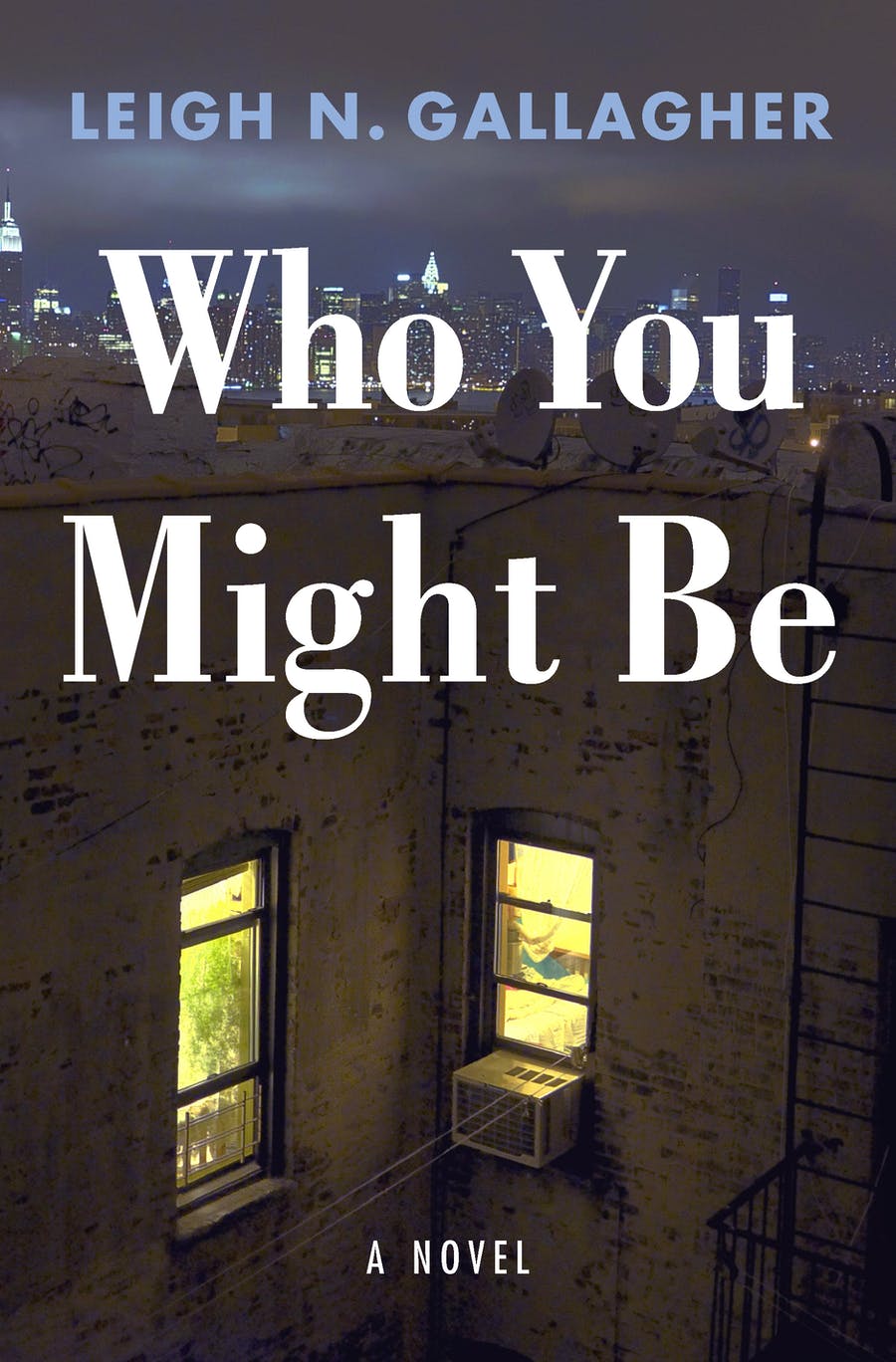To the Stranger Who Returned My Lost Notebook

The March night was freezing, but the Boystown club was humid with breath and euphoria, close dancing, the radiance of strobing pink lights. It took me a minute to get comfortable—I didn’t know Chicago, or anyone in the club except B, my best friend at grad school, but when the DJ played a pop anthem ubiquitous in 2010, about changing shapes but still being an animal, I surrendered.
Tessa and I had taken the bus to Chicago for the weekend from Ann Arbor, badly needing a break from our bookish MFA cohort. But due to some poor, twenty-five-year-old planning on our parts, we hadn’t first dropped off our stuff with the friend hosting us.
All day, I’d schlepped around spare underwear and my camera, a Madonna cassette (inexplicably), and my notebook, crammed into one tote bag. A tote bag that, when the music ended and the ugly-making lights came on, was no longer in the corner under my scarf, sweater, peacoat.
Did I not know about coat check at twenty-five? I can hear my own defense—But this isn’t my usual world! Clubs that play pop; so many wool layers. I’d only moved to the Midwest the previous fall, having left behind San Francisco, my friends at the French bakery and used bookstore where I’d worked, shows and parties in the Mission and SoMa (spaces where leaving your bag lying around didn’t matter, because you knew everyone in the room, or had at least slept with them). And I’d left behind R, the boy I’d thought I’d share a long and blissful life with, but instead shared an excruciating breakup with the previous semester.
By March I was finally beginning to rediscover moments of joy amidst the grief; grief I’d written about at length in my now-missing notebook. On the icy sidewalk, I borrowed B’s phone to cancel my bank cards.
There was no number I could call to cancel my journal. Back in Ann Arbor, I felt unmoored, a real hangover mingling with an emotional one. I’d kept some form of notebook for most of my literate life; a mostly boring diary as a kid; a moody journal as a teenager; and, around college, when I began to write fiction, a looser recording of experiences, ideas, reading notes—anything I feared might otherwise slip away.
I was the kind of notebook keeper Joan Didion so perfectly describes, in “On Keeping a Notebook,” one of those “children afflicted apparently at birth with some presentiment of loss.” All the more unsettling, then, to lose the only record of what’s been narrowly saved. I contented myself to think that if anyone had intercepted my notebook, they wouldn’t get very far, by the same law that says no one can stand to listen to anyone else recount their dreams.
What I didn’t expect was a Facebook message. A stranger named T had discovered my bag, she said, on an Ohio-bound Greyhound, and was eager to get its contents back to me. “Girl, not to be a hippie, but when I found your stuff I felt like the universe put it there for me to find you.” I was overcome with gratitude. When the package arrived days later, I tore it open, relieved.
Then—confused. My camera, ID, and notebook were there—but there were other, unfamiliar objects in the box, too: along with my Madonna tape, a Mary J. Blige cassette; a plastic dinosaur, novelty erasers, a plastic gemstone, something fashioned out of pipe cleaners. When I opened my journal, its pages were all intact, a California poppy still pressed inside, but a photo was notably missing from the back pocket, a picture of me on a street in Hamtramck. An enclosed letter began, “Dear Leigh, I read your journal.”
*
Under sweaters, behind other books—those who keep journals hide them because it’s the condition of the book’s privacy that makes writing it possible in the first place. A notebook page is by default a space protected from judgment, where anything can be jotted, no matter how clumsy or strange or shameful. In my experience, if the notebook is in-progress, the first impulse is to hide it from someone else.
But once it’s full, finished, the person you’re hiding it from is you—protecting future-you from the grating of your own whines, your corny choice of words; sparing yourself the amorphous pain of reliving too much that, ironically, you took such care to preserve. Today when I read the entries T would’ve, I’m reminded of the scene in Bridesmaids in which a shocked Annie asks Brynn if it’s true she’s read her diary. Brynn innocently responds, “I did not know it was your diary. I thought it was a very sad handwritten book.”
The saddest entries in my own handwritten book occur between October 2009 and January 2010, the months in which the Michigan temperature dropped and it became clear R wouldn’t join me at school after all, as we’d fantasized the previous summer. It all rushes back: walking zombie-like across campus as my eyelashes froze with tears; nights writing in a twenty-four-hour cafe, afraid to go home to my attic apartment, in an old house, where my loneliness doubled.
Receiving postcards from him, which only said I love you again and again, the way a child in detention is tasked with copying an affirmative—to pass the time, and so he won’t forget it. What I hadn’t been prepared for was how much R also loved his mediocre electronica band, his life in San Francisco—just like I loved reading and writing, and wanted a life in Michigan.
By November, “long distance monogamy” struck him as too ambitious, and by Thanksgiving, we became “long distance”—full-stop. Out of spite, I started sleeping with a Scandinavian statistics student who drove a vintage tomato-red Mercedes and laughed approximately once a month. I’d leave his house after a dissatisfying hook-up, full of remorse, my hurt compounded by the knowledge that R was seeing someone else, too, a scenester with Cleopatra bangs who stood in the front at all his shows.
I was cautiously flattered, but mostly totally spooked. She’d pulled back the curtain on both my deepest feelings, and my writing process.“After it’s been decided,” one entry reads, referring to one of our breaks, “everything in my room looks different. I am hesitant to put on certain records… the more I experience in the ‘new state,’ the more real it becomes.” But further down, the tone lightens. “How would I write this into a story?” The next six pages describe possible openings, character ideas, plot events. “How to balance the autobiographical and the invented?” I wondered, late in 2009.
Heartbroken monologues are disrupted with bursts of inspiration: “A character discussing her fuchsia stool after too many beets,” I noted, and, “What will happen when there are sixteen cats?” Now, I’m overcome with empathy for my little self: in the midst of so much turmoil, there I was, trying to be a writer, doing my best to turn life’s lemons into strong, bitter moonshine—something that could knock me out—and maybe, in another form, someone else, too.
*
At a little less than a page, T’s was the kind of critique letter I’d always wished for from my workshop-mates, brimming with praise and understanding. She referenced several short stories I’d been troubling over for months, writing how quirky and interesting she found those ideas—how excited she’d be to read my fiction someday. She called herself my “soul sister,” and went on to say, vaguely, how much of “me” she recognized in herself. She identified with my heartache and frustration over R; the depth of my love and suffering. My aspirations to write more, write better.
I was cautiously flattered, but mostly totally spooked. She’d pulled back the curtain on both my deepest feelings, and my writing process—had witnessed my haphazard formula for turning life into art, one that even I didn’t understand. What if, having been discovered, it no longer worked? What if T was in my apartment now, invisible over my shoulder as I composed sentences?
A Facebook message came the next day—“Hey, did you get the stuff??”—expectant, eager. The stuff—hers and mine combined, our stuff. My reply was polite but avoidant—“Yes, thank you so much! Happy spring!” I’d already returned my journal to my nightstand, but left T’s trinkets and letter inside the box—taped it up and hid it behind the spare lightbulbs in my pantry.
But what did she want? friends ask when I tell this story. What was she hoping to achieve, in sending that letter? She wanted, I think, to connect. She wanted me to know that she’d heard me calling out and she knew what I meant—my message had been received, however unintended its broadcast. And probably, she wanted a letter back. Had she waited for one? The thought makes me sorry, regretful now. “I made him a beautiful letter,” I wrote of R, weeks before our final end. “But there’s the possibility that he won’t send me anything—no response. Calling out to a dark, empty house.”
When I graduated the following year and packed up that apartment, in which half my life seemed to have happened, I left the box from T in the pantry, unable to throw it away, but feeling keenly that I couldn’t take it with me. I was moving to Detroit; I had a new job, and a writing fellowship, and was in love again, with someone whose dreams I was happy to listen to in the mornings. I was content just to be living my life, which, that summer, didn’t seem in urgent need of archiving. Now, of course, I wish I’d saved more.
_________________________________

Who You Might Be by Leigh N. Gallagher is available now via Henry Holt.